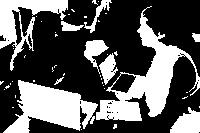
Gabriella Papper ’18 (left) and Phoebe Bumsted ’17 (right) are two of the four students doing research with Prof. Hall. They often meet in Little Dog Cafe in downtown Brunswick to work on their projects and bounce ideas off of one another.
Although digital and computational studies labs are more often found at big research universities, this summer four Bowdoin students and one professor have kicked off a similar initiative here on campus.
Sabina Hartnett ’18, Phoebe Bumsted ’17, and Hannah Rafkin ’17 all received a Digital Humanities Research Fellowship/Mellon Humanities Initiative Grants, and Gabriella Papper ’18 received a Gibbons Summer Research Grant, to work with Associate Professor of Digital Humanities Crystal Hall. The four students are engaged in their own digital and computational research and are also helping Professor Hall develop a curriculum for her fall semester Introduction to Digital Humanities class.
Digital and Computational Studies is the newest interdisciplinary initiative at Bowdoin and in the liberal arts more generally. Bowdoin is one of the first colleges to craft such a program that works across fields rather then primarily focusing on the humanities. “It’s essentially merging computer science and digital technologies with the humanities,” Hartnett explained, as well as working across the social sciences and STEM disciplines. “It’s sort of what you go to a liberal arts school to do,” Bumsted added, explaining that her experience with the program has been all about combining her varied academic interests.
The academic profiles of the four students demonstrate the interdisciplinary nature of the program. Rafkin studies English, but adds that “all my Bowdoin career has involved digital and computational studies, so I would consider it my unofficial minor.” Bumsted is a computer science and english double major. Hartnett is contemplating a math major, and Papper is undecided but has expressed interest in english, computer science and romance languages.
Their diverse academic backgrounds have proven to be an asset to the students’ projects. “It’s interesting getting peoples’ perspectives on your work and your project when people come to it from lots of different backgrounds,” Rafkin said. Echoing Rafkin’s sentiments, Professor Hall expressed her excitement that these students not only came from different academic backgrounds, but also all possessed second language skills. “That engagement with a foreign language gives you a different approach to computation,” she said.
“All of us are working together to see where this field could go — there are so many possibilities,” Papper noted.
This summer, Professor Hall and the Bowdoin students have been exploring a variety of the field’s most interesting facets, from computational readings of novels to following Twitter hashtags and protests, weaving together computer coding, literature, government, history and sociology in new ways. Professor Hall says that her students are able to investigate the various digital tools that are used to explore the liberal arts, and “go under the hood and see how they are working.”
Bumsted’s summer work consists of doing a computational reading of Umberto Eco’s novel The Name of the Rose. She is trying to understand how this Italian mystery novel diverts and distracts the reader from solving the murder, and will later try to predict the endings of murder mysteries using only that novel’s data. In this way, this project weaves together her interest in computer science and English. “This summer has been a lot about giving me the tools to combine those two fields, in ways that I probably wouldn’t have thought of,” she said.
Similarly, Papper is combining history with computational analysis, as her research focuses on discovering what General Joshua Chamberlain could see during the Battle of Gettysburg on Little Round Top.
Rafkin’s research is an extension of what she had begun in a digital and computational class called Data Driven Societies, when she followed a hashtag, #BlackLivesMatter, throughout the semester to observe how people were communicating about current events. “In February I was scraping tweets and there were events happening Ferguson,” she said. “In April and May and there was stuff happening in Baltimore. And then this summer, things just blew up — the Rachel Dolezal [story], the Charleston shooting.” The aim of Rafkin’s project is to create a tutorial for faculty and students so that they can pursue similar social media research.
While all four students all highlight the powerful tool technology has proven to be in their research, they have also learned to engage critically with technology, whether that be in the classroom or in their daily social media use. Hartnett, whose research focuses on how individual identities have changed with the age of social media and digitization, said, “After doing this I am hyper-aware of my own interactions with technology as well as other peoples’.” For Professor Hall, the student’s reactions to their research “have been the most inspiring part,” she says, adding “it’s encouraging to see that change” in their attitudes towards technology.
Thanks to the research completed and the questions asked (and answered) by these four students, Professor Hall expects that her Introduction to Digital Humanities class “will be a much richer experience,” both for herself and her future students.
